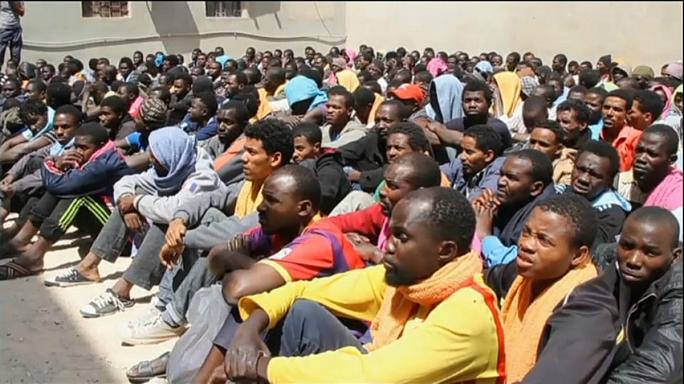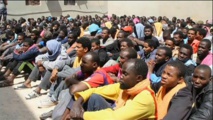.
Apart from German Chancellor Angela Merkel, French President Emmanuel Macron, Libyan Prime Minister Fayez Serraj and representatives of Niger, Chad, the United Nations, as well as the European Union and African Union, were expected to participate in the crisis meeting on Wednesday evening.
It should be ensured that migrants could return from Libya to their home countries under humane conditions, Merkel said on the first day of the two-day summit.
More than 80 European and African leaders attended the EU-AU summit to talk about migration, security and youth development.
In emergency cases, individual migrants should be allowed to enter Europe, Merkel said.
"We must not only denounce but act," Macron said about the crisis talks. "What we are going to do tonight ... is an initiative aimed at launching concrete military and police actions on the ground" against people-smugglers in war-torn Libya.
Libyan Prime Minister Fayez Serraj and his rival, eastern Libyan military leader Marshal Khalifa Haftar, are taking action on the ground, Macron said, "but we have to carry out a strengthened policing action to dismantle these networks."
The participants will explore options for action on how to provide UN refugee agency UNHCR and the International Organization for Migration (IOM) with access to the "terrible camps" in Libya, Merkel said.
The AU would have to engage with all ethnic groups in Libya, as the prime minister did not have control over all areas of the country, according to Merkel. Step by step, international aid organizations should be able to work again permanently in Libya.
Germany and Italy would provide financial support if Libya was prepared to actively participate in the measures taken, said Merkel.
Holding migrants "in the most terrible manner in camps" or "trading" them needed to be prevented, Merkel said.
A CNN report earlier this month cast a spotlight on human rights abuses in Libya by broadcasting footage of African migrants being auctioned off as slaves in the North African country, for as little as 400 dollars.
According to reports, migrants detained in Libya are also being tortured, raped and murdered.
In his opening speech, Ivorian President Alassane Ouattara said the international community needed "at all cost to end the inhumane treatment inflicted onto migrants."
The situation in Libya had become "completely unacceptable ... bringing to mind the worst hours in the history of mankind," Ouattara added.
European Council President Donald Tusk and AU commission chairman Moussa Faki Mahamat demanded joint action.
"The worst we can do is to start the blame game," Tusk said. "What we need now are common solutions and stronger cooperation to save lives."
"Our common duty is to step up the fight against these unscrupulous criminals and bring them to justice," Tusk added.
The EU, AU and UN announced the launch of a joint task force to save and protect migrants, particularly inside Libya.
In close coordination with Libyan authorities, the task force aims to speed up voluntary returns to countries of origin; the resettlement of those in need of international protection; and the dismantling of trafficking and criminal networks, the joint statement read.
Nigeria's President Muhammadu Buhari meanwhile vowed to bring home all Nigerian migrants stranded in Libya and other parts of the world.
"All necessary steps will be taken to stem the tide of illegal migration by Nigerians," Buhari said on the sidelines of the summit.
He pledged to improve the delivery of basic services, including education, health care and food security, to reduce the number of Nigerians taking the dangerous route through the Sahara and across the Mediterranean towards Europe.
Another focus of the two-day summit will be on creating better education and economic opportunities for Africa's rapidly growing population, which is set to more than double to 2.4 billion people by 2050, according to the United Nations.
About 60 per cent of Africa's population is under the age of 25.
The EU hopes that economic support to Africa will eventually lower the number of people migrating through the Sahara and across the Mediterranean - considered to be the world's most dangerous migration route - to Europe.
The International Organization for Migration (IOM) said this week that the number of dead or missing migrants in the Mediterranean has risen above the 3,000-mark for the fourth year in a row.
It should be ensured that migrants could return from Libya to their home countries under humane conditions, Merkel said on the first day of the two-day summit.
More than 80 European and African leaders attended the EU-AU summit to talk about migration, security and youth development.
In emergency cases, individual migrants should be allowed to enter Europe, Merkel said.
"We must not only denounce but act," Macron said about the crisis talks. "What we are going to do tonight ... is an initiative aimed at launching concrete military and police actions on the ground" against people-smugglers in war-torn Libya.
Libyan Prime Minister Fayez Serraj and his rival, eastern Libyan military leader Marshal Khalifa Haftar, are taking action on the ground, Macron said, "but we have to carry out a strengthened policing action to dismantle these networks."
The participants will explore options for action on how to provide UN refugee agency UNHCR and the International Organization for Migration (IOM) with access to the "terrible camps" in Libya, Merkel said.
The AU would have to engage with all ethnic groups in Libya, as the prime minister did not have control over all areas of the country, according to Merkel. Step by step, international aid organizations should be able to work again permanently in Libya.
Germany and Italy would provide financial support if Libya was prepared to actively participate in the measures taken, said Merkel.
Holding migrants "in the most terrible manner in camps" or "trading" them needed to be prevented, Merkel said.
A CNN report earlier this month cast a spotlight on human rights abuses in Libya by broadcasting footage of African migrants being auctioned off as slaves in the North African country, for as little as 400 dollars.
According to reports, migrants detained in Libya are also being tortured, raped and murdered.
In his opening speech, Ivorian President Alassane Ouattara said the international community needed "at all cost to end the inhumane treatment inflicted onto migrants."
The situation in Libya had become "completely unacceptable ... bringing to mind the worst hours in the history of mankind," Ouattara added.
European Council President Donald Tusk and AU commission chairman Moussa Faki Mahamat demanded joint action.
"The worst we can do is to start the blame game," Tusk said. "What we need now are common solutions and stronger cooperation to save lives."
"Our common duty is to step up the fight against these unscrupulous criminals and bring them to justice," Tusk added.
The EU, AU and UN announced the launch of a joint task force to save and protect migrants, particularly inside Libya.
In close coordination with Libyan authorities, the task force aims to speed up voluntary returns to countries of origin; the resettlement of those in need of international protection; and the dismantling of trafficking and criminal networks, the joint statement read.
Nigeria's President Muhammadu Buhari meanwhile vowed to bring home all Nigerian migrants stranded in Libya and other parts of the world.
"All necessary steps will be taken to stem the tide of illegal migration by Nigerians," Buhari said on the sidelines of the summit.
He pledged to improve the delivery of basic services, including education, health care and food security, to reduce the number of Nigerians taking the dangerous route through the Sahara and across the Mediterranean towards Europe.
Another focus of the two-day summit will be on creating better education and economic opportunities for Africa's rapidly growing population, which is set to more than double to 2.4 billion people by 2050, according to the United Nations.
About 60 per cent of Africa's population is under the age of 25.
The EU hopes that economic support to Africa will eventually lower the number of people migrating through the Sahara and across the Mediterranean - considered to be the world's most dangerous migration route - to Europe.
The International Organization for Migration (IOM) said this week that the number of dead or missing migrants in the Mediterranean has risen above the 3,000-mark for the fourth year in a row.









 Home
Home Politics
Politics











